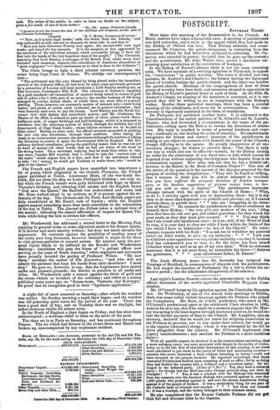POSTSCRIPT.
SATURDAY NIGHT.
More signs this morning of the fermentation in the Church. At Hurst, matters have taken a favourable turn. A meeting of parishioners was held yesterday, and a reply to the appeal which they had made to the Bishop of Oxford was real. That Prelate relented, and coun- tenanced Mr. Cameron, the parish-clergyman, in retracting from the alterations which he had heretofore persisted in enforcing. Mr. Ca- meron, who attended in person, declared that he gave up the contest ; and the parishioners, Mr. John Walter dace, passed a resolution ex- pressing great satisfaction at the restoration of harmony. In the Bishop of Exeter's diocese there is not the same returning calm. We have accounts of a swelling agitation in Plymouth, to oppose the " innovations " in public worship. The town is divided into two parishes, St. Andrew's and Charles's ; the former having two Episcopal places of worship besides the parish-church, and the latter one besides the parish-church. Meetings of the congregations of four of these places of worship have been held, and measures adopted in opposition to the Bishop of Exeter's pastoral letter at each of them. At the fifth, St. Andrew's Chapel, no meeting of the members is convened, as it is ex- pected they will be willing to act in compliance with the Bishop's wishes. Besides these parochial meetings, there has been a general meeting of the inhabitants, and more are in contemplation. The con- troversy is vigorously sustained in the form of resolutions.
Dr. Phillpotts has published another letter. It is addressed to the Churchwardens of the united parishes of St. Sidwell's and St. James's, Exeter; who had forwarded a remonstrance in the name of the pa- rishioners, calling upon the Bishop to revoke his directions of altera- tion. His reply is couched in terms of paternal kindness and cour- tesy; studiously so, but bearing the guise of sincerity. He emphatically recognizes the honest and earnest intention of the parishioners as aiming at one object in common with himself, the peace of the Church; though differing as to the means. He greatly disapproves of all un- necessary changes ; he wishes to prevent them : "but there is only one way in which this can be effected—namely, by the Bishop issuing an order for the observance of one fixed rule—a rule which cannot be departed from without subjecting the clergyman who departs from it to ecclesiastical censure. Now what rule can that be, but a faithful ad- herence to the Rubric in the Book of Common Prayer ?" One test of the merits of the question is the amount of the changes proposed for the purpose of settling the irregularities : " They will be found so trifling, that I venture to think you will be almost ashamed to recollect that you have suffered the arrogant dictation of London newspa- pers, or the baseless suggestions of persons nearer home, to ter- rify you with so mere a bugbear." The parishioners deprecate changes imbued with the spirit of the Church of Rome : " Why, so do I; I entirely agree with you in deprecating them: but it is my duty to do more than deprecate—to prohibit and prevent; or, if I cannot prevent them, to punish those * * who are ' straggling in the direc- tion of Rome.' " He counsels the parishioners to observe obedience to himself, their Bishop: " the very pith and marrow of the text, Obey them that have the rule over you, and submit yourselves; for they watch for your souls, as they that must give account.' * * * You may think that I am a rash and injudicious ruler : be it so; still, if the Word of God be true, it is your duty to obey me while I keep within the limits of the law which I have to administer—the law of the Church." He inter- changes requests with his flock : " You ask me to withdraw my pastoral letter—in other words, to give up my authority : * * I ask you to withdraw your opposition—to respect my authority—to obey it, because God has commanded you to obey it ; for the letter has been issued (whether wisely or not) as an act of my own duty." With an elaborate assurance that it is not mere form, he subscribes his letter—" Believe me, gentlemen, * * * your affectionate father, H. Exeter."


























 Previous page
Previous page